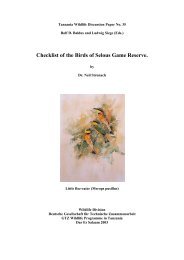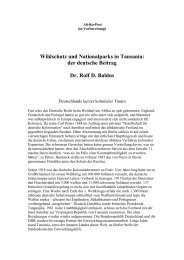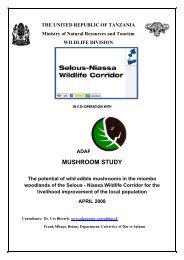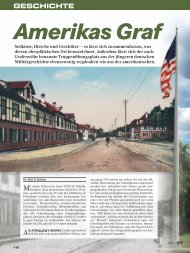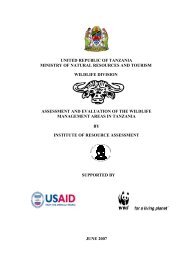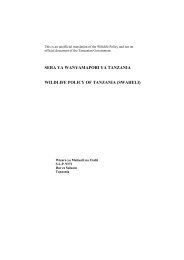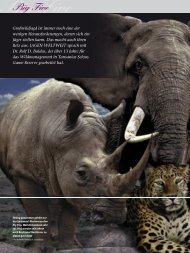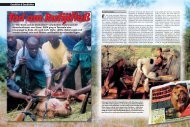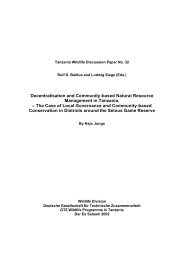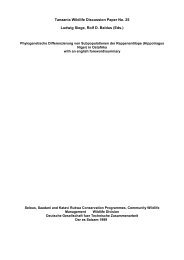African Indaba Articles - wildlife-baldus.com
African Indaba Articles - wildlife-baldus.com
African Indaba Articles - wildlife-baldus.com
You also want an ePaper? Increase the reach of your titles
YUMPU automatically turns print PDFs into web optimized ePapers that Google loves.
eplaced by holistic triple-bottom-line <strong>com</strong>binations to reduce the dependence on unsustainable donorfunding as well as on subsidies from public budgetsTourist Hunting in Tanzania: Issues Behind the IssuesBy Alan RodgersThe process of developing a hugely detailed <strong>wildlife</strong> policy in the mid nineties <strong>com</strong>missioned in-depthreviews of the hunting industry, including financial and economic analyses. Questions were asked about thedifferences between foreign exchange inflows recorded at the Bank of Tanzania and projected revenuesextrapolated from numbers of clients and safaris per year.These reports did, however, document the great financial contribution of the tourist hunting industry toTanzania. For example the total direct earnings in 1992 were almost 14 million USD, of which 5.3 millionUSD were direct fees to "government", including the Tanzanian Wildlife Protection Fund, Wildlife Division andDistricts. By 2001 these figures had virtually doubled. When you add all of the indirect payments around thishunting effort (travel, hotels, payments to outfitters, souvenirs etc.) and using a scaling up factor of "x 2" thenwe have an industry of over 80 million dollars a year. Totals have gone up since 2001.This large increase has <strong>com</strong>e about as a result of a larger quota, increased quota utilization and morehunting blocks. Blocks have been subdivided and quotas doubled (with little apparent ecological justification,but that is another story!) and new areas have been set aside for tourist hunting.Hunting takes place on three categories of land: Firstly in Game Reserves, fully owned by governmentwith no people residing within. Secondly hunting is taking place in Game Controlled Areas, mainly gazettedin colonial times to prevent hunting by local people, so as to maintain trophy quality. But these areas allowed,and still allow settlement, cultivation, livestock, mining etc. Habitat and <strong>wildlife</strong> numbers are not protected,only hunting rights. Areas include Longido, Loliondo (site of the still controversial concession to UAE huntinginterests), Lolkisade-Simanjiro (site of the past land allocation to Steyn and colleagues, ostensibly for cattleranching), and vast areas in Western Tanzania.Thirdly, more recently tourist hunting blocks have been "allocated" on non gazetted lands or "open areas".These include areas around Ruaha National Park in Iringa, the Ngarambe-Tapika area south of the Rufiji etc.These allocations, most of which were never discussed with the <strong>com</strong>munity "stakeholders", have usurpedvillage based <strong>wildlife</strong> enterprises, such as the Ngarambe-Tapika interim Wildlife Management Area,seemingly against the principles of the Wildlife Policy of 1998.This is the basis of the whole ethical dilemma of hunting today: land ownership and benefits. Everyoneagrees that tourist hunting in Game Reserves is necessary and the Wildlife Division is the final decisionmaker of who, where, when and for how much. But most Game Controlled Areas and Open Areas are onvillage land. The national Village Land Act is quite clear that village governments have jurisdiction of land usein these areas. Villagers can decide to cultivate or not cultivate, to lease land to outsiders or not lease suchland. In a number of cases villagers in areas close to National Parks have leased land to privateentrepreneurs for game-viewing tourism ventures. This is in line with the Tourism Policy, with the TanzaniaInvestment code and with recent Presidential Statements (2002) on the key role of village enterprise intourism growth. This in many ways is a "win-win" situation; except there now appears to be a potential loser -the Wildlife Division-Hunting Lobby nexus. When game viewing tourism areas are hunted by tourist huntingsafaris the animals be<strong>com</strong>e wary of vehicles and difficult to observe or photograph. Game viewing operatorsand often village governments thus want no hunting in those areas. Safari hunting operators with WildlifeDivision backing want hunting to continue and for tourism interests to close down.To some extent, the situation arises from ownership rights. Whereas the present law gives land rights tovillage governments; access to <strong>wildlife</strong> (basically to hunt, capture or use) remains with the government. TheWildlife Division in late 2003 wrote to all private enterprise tourism ventures in these disputed areas sayingthat it is illegal to photograph (or even perhaps to look at) <strong>wildlife</strong> in these village lands without thepermission of the Director of Wildlife. The irony being that you can photograph trees, the scenery and even66



